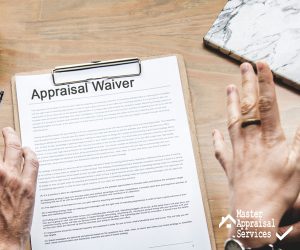What is an Appraisal Waiver in NYC (2024)
Go Back To Previous PageWhen you buy a home with a mortgage, the lender typically requires an appraisal to verify the property’s value. However, in some instances, the lender may offer the homeowner an appraisal waiver, allowing them to skip the in-person appraisal process. Here’s how it works.
What Is an Appraisal Waiver?
An appraisal waiver is an option some lenders provide that allows borrowers to forgo the property appraisal, typically required to determine the property’s fair market value. Instead, the lender pulls comparable sales data and uses automated valuation models (AVMs) and other data to assess the property’s value.
Instead, the lender pulls comparable sales data and uses automated valuation models (AVMs) and other data to assess the property’s value.
Appraisal Waiver Requirements
Not all properties or borrowers qualify for an appraisal waiver. The lender’s criteria determine eligibility. Lenders typically require high credit scores and low loan-to-value (LTV) ratios to receive an appraisal waiver.
Home buyers must also purchase a single-family home with an eligible mortgage to qualify.
Why Would a Lender Waive an Appraisal?
- Home Value Recently Calculated
- Speed Up the Underwriting Process
- High Down Payment
- Government-Backed Streamlined Refinance
1. Home Value Recently Calculated
If the lender decides an appraisal is unnecessary, they may grant a waiver. For example, if the buyer bought the home earlier in the year but needs to sell it for some reason, the lender may be satisfied with the original appraisal and not require a new one to be done.
2. Speed Up the Underwriting Process
Appraisals take time. You must find a qualified professional and schedule a time for them to inspect the home, which can take several weeks or more. If the lender is confident in their ability to assess the property’s value, they may skip the appraisal process to expedite the transaction.
3. High Down Payment
If the buyer makes a sizable down payment on the home, obtaining an appraisal waiver will be relatively easy, as the lender will not consider the loan risky.
The more equity you have in the house, the less risk it poses for the lender, as they will always be able to recover their investment if you cannot make your monthly mortgage payments and they must foreclose.
4. Government-Backed Streamlined Refinance
The FHA and the VA offer streamlined refinance programs that allow eligible homeowners to refinance a mortgage already insured by one of these government programs. If you meet the requirements, the lender must let you refinance without requiring a new appraisal.
How to Get an Appraisal Waiver
Consult with your lender to understand the requirements for qualifying for an appraisal waiver. Keep in mind that not all lenders offer appraisal waivers. Generally, you will need a high credit score and a substantial down payment to be eligible for this type of mortgage loan.
Your loan-to-value ratio must usually be 80% or higher to qualify for an appraisal waiver.
Additionally, the type of property you are purchasing is a factor. Appraisal waivers are usually only available for single-family homes and condos. If you are considering buying a multi-family property, you will not be eligible for an appraisal waiver.
Therefore, you must check with your lender to get the specific requirements.
Benefits of an Appraisal Waiver
1. Saves Money On Fees
Buyers typically have to pay the appraisal fee, unless the seller agrees to cover some or all of the closing costs. Sometimes, this waiver can save you from paying the fee, which is generally around $300-$500.
When you consider all the other expenses of buying a home, this can be a welcome relief for many buyers.
2. Speeds Up the Closing
Waiving the appraisal can also help speed up the closing process. Depending on your location, your lender may trust only a limited number of qualified & professional appraisers. By skipping this step, you can avoid delays affecting the closing.
Downsides of an Appraisal Waiver
1. You Might Overpay
One potential drawback of an appraisal waiver is the uncertainty regarding the actual value of the home being purchased. An appraisal aims to confirm that the house is worth approximately the amount you pay. While the computer-generated comparisons the lender provides are typically reliable, they are not as reliable as an official appraisal.
Without an official valuation, there is no guarantee that the home is worth the amount you are offering. Although the lender’s willingness to waive the appraisal suggests minimal risk of overpayment, there is still uncertainty. If you must sell the home shortly, there is a possibility that you may not recoup the amount you paid for it.
2. Loan Limitations
Appraisal waivers are not widely available for jumbo loans, FHA loans, and properties in unique markets.
Appraisal Waiver Bottom Line
An appraisal waiver can be a beneficial option for eligible homebuyers and refinancers. It offers cost savings, faster closing times, and reduced hassle. However, it’s essential to consider the potential downsides, such as accuracy concerns and the risk of overpayment.
Consult with your lender and your real estate agent to determine if an appraisal waiver is viable for your mortgage needs.
Additionally, ensure you understand the specific eligibility criteria and their implications.


